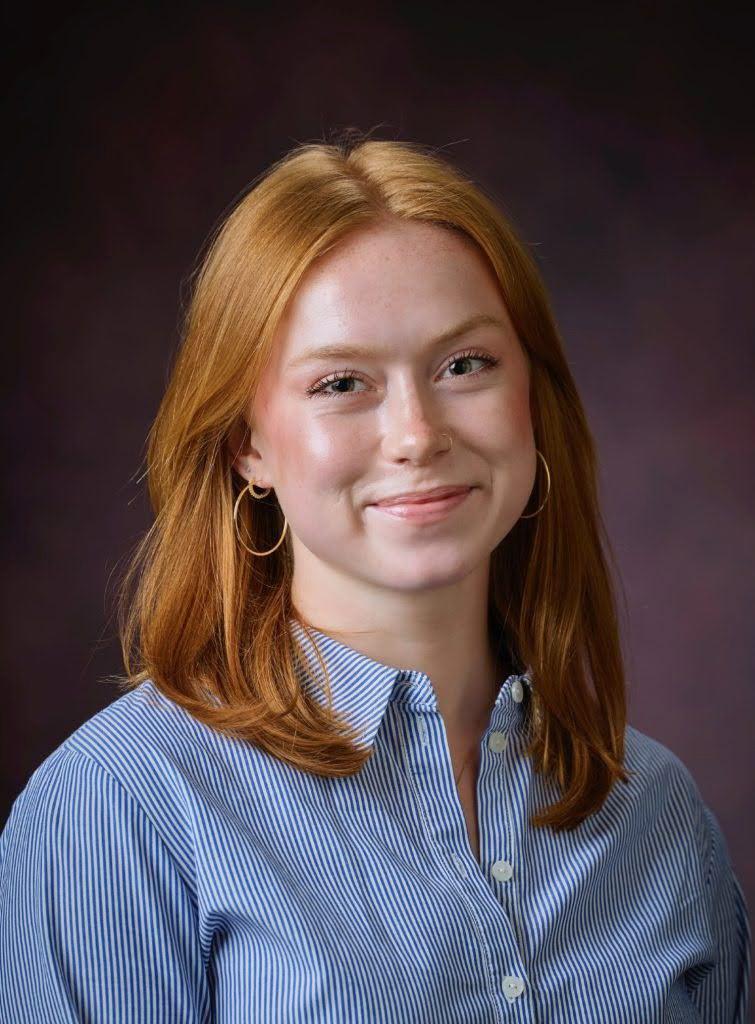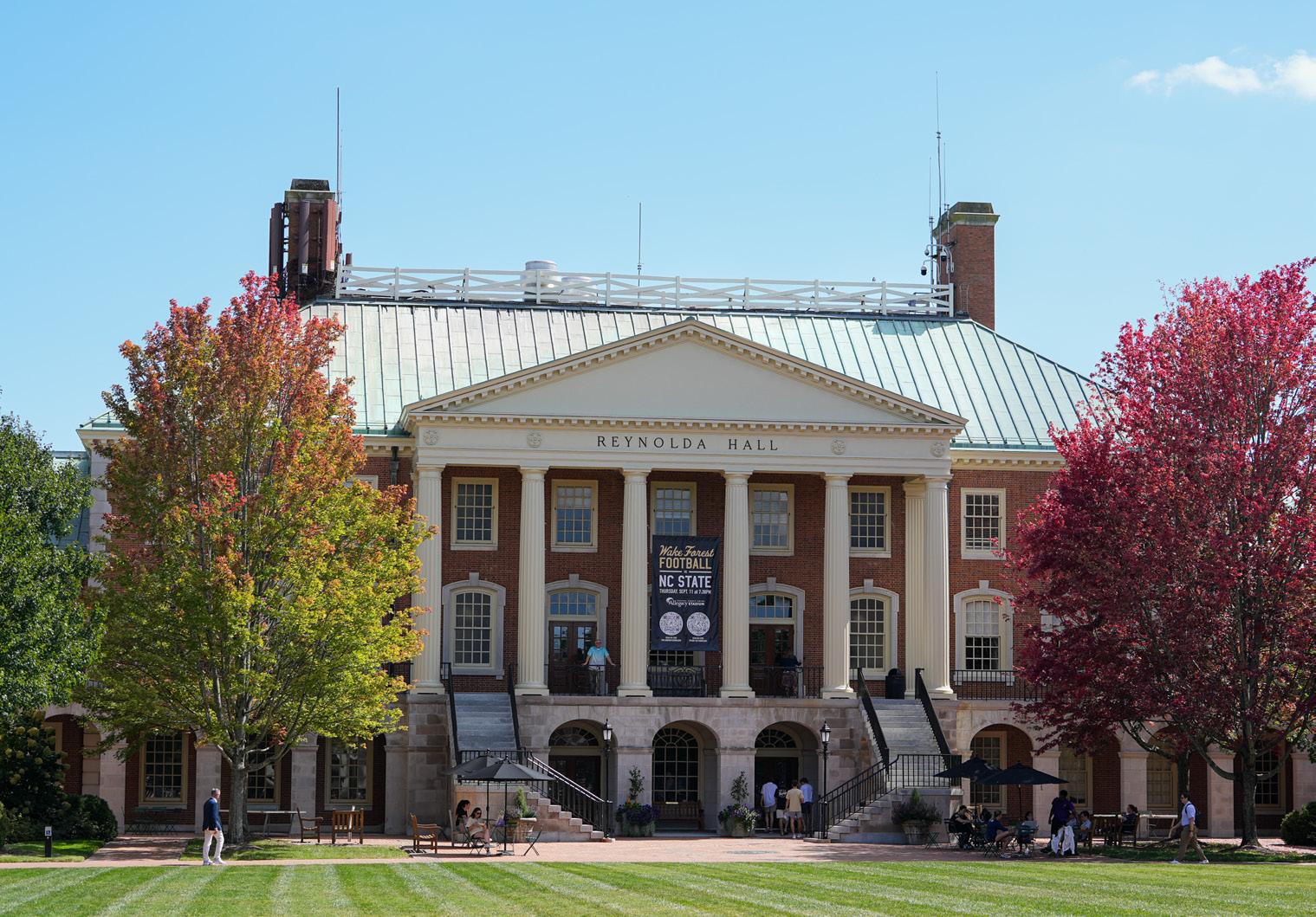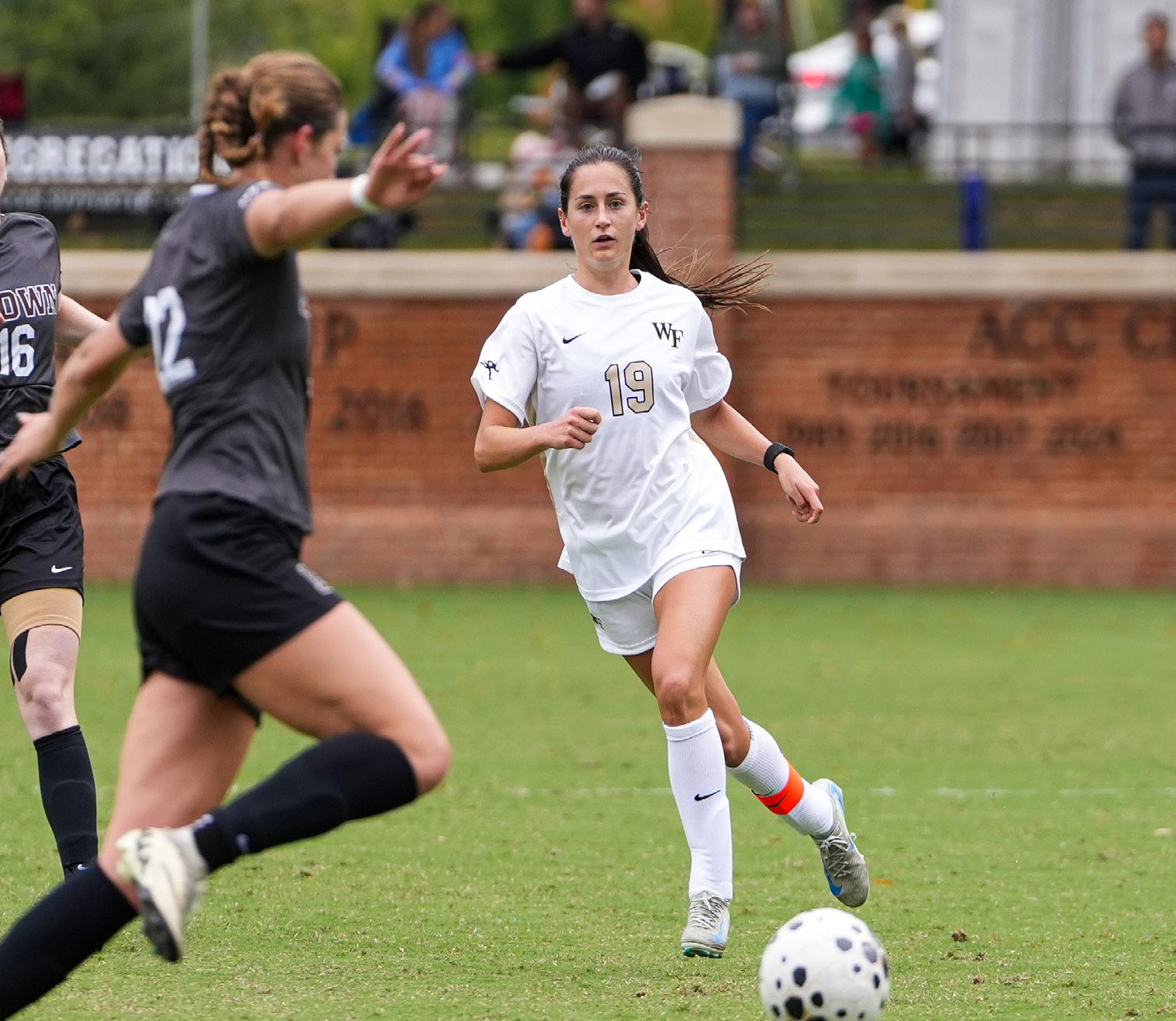Old Gold&Black
After five years, the Wake Forest University president will step down in June 2026

ELLA KLEIN Editor-in-chief


ELLA KLEIN Editor-in-chief
CAROLINE KHALAF News Editor
For the third year in a row, Wake Forest has dropped in the U.S. News & World Report's annual Best National Universities list. After falling dramatically from a top 30 spot in 2023, Wake Forest is now below the top 50 line.
Wake Forest tied with five other universities for the No. 51 spot — Case Western Reserve University, Florida State University, Texas A&M University and Virginia Tech.
Wake Forest’s 14th President, Susan R. Wente, has announced she will conclude her presidency on June 30, 2026.
In a broadcast titled “A message from President Wente,” she briefly touched on her reasoning behind this decision.
“In higher education, timing is critical, and I believe now is the right moment to begin this transition. This is because Wake Forest is in a strong, stable, and even enviable position among the nation’s universities,” she said. “And with nine months to carefully plan before June 30, I am confident our University is well-positioned to attract an extraordinary new leader.”
In the broadcast, she referred
to concluding her presidency as a ‘personal decision.’ Following a sabbatical, Wente plans to return to ‘her roots’ as a faculty member.
She did not offer further explanation regarding the decision to conclude her time in office.
In a release from Wake Forest University Marketing and Public Relations office, Senior Executive Director of News and Public Relations Cheryl Walker reported this decision was made after discussions with the board of trustees.
“Wente arrived at this decision after discussions with Board of Trustees leadership about the university’s current stability, positive momentum, and the need for a thoughtful succession plan,” Walker wrote.
In the same release, Wake
Forest University Board Chair Jeanne Whitman Bobbitt shared sentiments about Wente’s time in office.
“Serving now in the fifth year of her presidency, she has positioned Wake Forest well for greater success, and after leading through a tumultuous time in higher education, she has earned our deepest respect and gratitude.” Whitman Bobbitt said. “And when her presidency concludes, she will enjoy a well-earned sabbatical, followed by a return to her scientific roots.”
Further information on a succession plan is not known at the time of publication.
Contact Ella Klein at kleikek22@wfu.
Most of the metrics were consistent with the 2023 methodology, which introduced a new way of ranking schools, changing 17 of the 19 measures. This year, many top-ranked universities maintained their positions on the ranking. Princeton, MIT and Harvard all took the No. 1, No.2 and No. 3 spots for the third consecutive year. In 2023, Wake Forest’s ranking dropped 18 spots from its No. 29 spot. This was the first time the university has been ranked out of the top 30 since 1996 and its lowest ranking since joining the National Universities list. This year, the university dropped from No. 46 to No. 51.
Beginning in 2023, U.S. News no longer considers factors such as small class sizes, instruction by professors with a terminal degree, alumni giving average, graduate debt or students’ high school standings. Wake Forest highlights and prioritizes many of these elements, according to Vice President of Communications & Chief Communications Officer Brett Eaton. The algorithm change in 2023 also added seven new indicators — four related to faculty research, two related to first-generation graduation rates and one related to graduate income.
This column represents the views of the editor-in-chief of the Old Gold & Black, Ella Klein.
When I first applied to Wake Forest, we were ranked as the #28 school in the nation, by the metric of the US News & World Report Best National Universities list. As you can read in our front page story, we are now #51.
This is the third year in a row we have sunk in the rankings. Has this changed my experience at Wake? Absolutely not.
While I could wax poetic about Mother So Dear for my entire editorial, I will keep it real — there are many areas where I feel Wake Forest could improve as an institution. However, under no guise of superiority do I think we should
care about the ranking of our university.
One of the reasons I chose Wake Forest is its vast alumni network and high job placement rate. While going to a top 30 university was nice, I am still set up for success after I depart from Wake Forest, in the same manner I was before. This did not change. Our faculty-to-student ratio is still incredibly small, and I feel my professors are invested in my academic life almost as much as I am. This, too, has not changed with our fall in rankings.
The phrase ‘the people make the place’ is overstated for a reason: it’s incredibly true. Even if, on
paper, you don’t fit into the standardized culture of Wake, you can easily find your spot on campus. For nerds like me, that was this newspaper. At a larger university, I don’t know if I would have had the confidence to ever write an article, let alone feel empowered enough to run the whole operation. Wake Forest has a bubble of support and a close-knit community. There is care put into the students, from faculty, staff and peers. While I acknowledge that the university has faults and areas to grow immensely, I can also confidently say that I don’t give a damn about our ranking.
THE STUDENT NEWSPAPER OF WAKE FOREST UNIVERSITY SINCE 1916
ELLA KLEIN EDITOR-IN-CHIEF kleiek22@wfu.edu
ANDREW BRAUN MANAGING EDITOR brauar23@wfu.edu
>> NEWS
Caroline Khalaf, khalca23@wfu.edu
Jill Yoder, yodejs24@wfu.edu
>> CITY & STATE
James Watson, watsjc22@wfu.edu
Nick Costantino, costnp24@wfu.edu
>> FEATURES
Alexandra Meier, meieam22@wfu.edu
Miriam Fabrycky, fabrml24@wfu.edu
>> ENVIRONMENT
Reese Lile, lilerl24@wfu.edu
>> OPINION
Towne Moores, moortv24@wfu.edu
Sara Catherine Bradshaw, bradsc24@ wfu.edu
>> SPORTS
Scottie Kimmelman, kimmsd22@wfu.edu
James Lombardo, lombjp23@wfu.edu
SKYLER VILLAMAR-JONES DEPUTY EDITOR villsc22@wfu.edu
>> ARTS & CULTURE
Lydia Derris, derrlf23@wfu.edu
Grace Schuringa, schugh24@wfu.edu
>> PHOTO
Piper Saunders, saunpg23@wfu.edu
>> VIDEO
Jack Perez, perejw22@wfu.edu
Evan Harris, harres22@wfu.edu
>> SOCIAL MEDIA
Sophie Chan, chansr23@wfu.edu
>> COPY EDITORS
Jenna Jordan, aginjr21@wfu.edu
Elle Yormak, yormeh24@wfu.edu
Presley Tsang, tsanpe24@wfu.edu
>> DESIGN CHIEF
Cate Goldman, goldcr24@wfu.edu
>> ADVERTISING DIRECTOR
Jordan Rill, rillje22@wfu.edu
>> ADVISER
Ivan Weiss, weiij@wfu.edu
Pitting ourselves against other univers ities and focusing on numbers is not enhancing anyone's college experience. Although I sound like a humanities professor telling you not to focus on grades, my sentiments, I hope, will strike a chord. While our rankings may have dropped, I believe our university is striving to be better and continuing to support our students. As always, my advice is to make the most of your time and resources that we are incredibly privileged to have while atten ding a still-prestigious university.
WILL KUNISAKI MULTIMEDIA DIRECTOR kuniwx23@wfu.edu
>> POLICIES
RYDER SOLBERG BUSINESS MANAGER solbrs23@wfu.edu
Our job as a newspaper is to be a platform for all voices, not just the ones we agree with. However, we reserve the right to reject advertisements that are vulgar, inaccurate, obscene or violate Wake Forest’s policies on nondiscrimination, diversity, equity, and inclusion as they pertain to student organizations. We will also reject any advertisements that promote illegal activities according to the state of North Carolina.
Not only do we hold our newspaper and its contents to a high standard, but we also expect that those who choose to use us as an outlet for their ideas, opinions and skill hold themselves and their content to a high ethical standard.
The Old Gold & Black is published Thursdays during the school year, except during examinations, summer and holiday periods, by Triangle Web Printing of Durham. The views expressed in all opinion pieces and advertisements contained within this publication do not necessarily reflect the opinions of the Old Gold & Black. As part of our commitment to reporting news fairly and accurately, we will not remove any previously published content online unless it is retracted. If an error in either our online or print content is brought to our attention, we will revise the originally published article with an appended correction. In order to facilitate thoughtful and appropriate debate, profane, vulgar, or inflammatory comments on our website are not allowed and will be deleted. Comments which incite violence, target individuals in a form of cyber bullying, or which promote ideas which vilify marginalized communities will be deleted, and proper authorities may be notified and involved.
>> SUBMISSIONS
The OGB welcomes submissions in the form of story tips, columns and letters to the editor. Letters to the editor should be fewer than 500 words, and columns should be around 500 words. Send yours via e-mail to stopmf21@wfu.edu the Monday before publication. We reserve the right to edit all letters for length and clarity. No anonymous letters will be printed.
>> ONLINE MEDIA
Website: wfuogb.com
Facebook: facebook.com/ogb1916
X (Twitter): @wfuogb
Instagram: @wfuogb
TikTok: @wfuogb
Sports X (Twitter): @wfuogbsports
The Gateway to Wake Forest program will make Wake Forest more accessible to high-achieving in-state students
CAROLINE KHALAF News Editor
On Sept. 17, Wake Forest announced that the university will become tuitionfree for admitted students from North Carolina whose families earn less than $200,000. “The North Carolina Gateway to Wake Forest” program will launch for admitted undergraduates in 2026.
Additionally, for North Carolina students with an annual family income less than $100,000, financial aid will cover the cost of standard living expenses in addition to the full cost of tuition. Students from North Carolina with an annual family income between $200,000 and $300,000 will be eligible for financial aid covering 50% of tuition.
In an email from the Wake Forest Office of Communications and External
Relations, Vice President for Enrollment Eric Maguire expressed the reason behind this decision.
“We want to demonstrate our affordability to North Carolina families,” Maguire said. “More of our undergraduate students come from North Carolina than from any other state. The program will allow families to see and understand their likely out-of-pocket costs from the beginning.”
According to Maguire, the program aims to make Wake Forest a possibility for more in-state students.
“The initiative directly addresses the most pressing barrier to access for students in North Carolina - the perception that Wake Forest is too expensive to consider,” Maguire said in an email to the Old Gold & Black.
This initiative makes Wake Forest more accessible for high-achieving students from North Carolina.
“As a Pell grant recipient, private colleges in my home state felt entirely out of reach,” President Susan R. Wente said. “I want talented North Carolinians from across the income spectrum to know they can come to Wake Forest and receive a transformational education.”
Much of the cost will be covered by the university’s established financial aid resources.
“For the past several years, the university has met 100% of students’ demonstrated financial need,” Maguire said. “The additional cost to Wake Forest will be offset by philanthropy and moderate, incremental enrollment growth.”
This initiative helps to continue Wake Forest’s longstanding commitment to minimize student loans by increasing financial aid and scholarships.
“We are grateful for the generous
support of donors,” Wente said. “Their investments in undergraduate scholarships and financial aid at Wake Forest are crucial to our ongoing efforts to increase access and affordability for low and middle-income families.”
The university expects the Gateway program to fuel even greater student interest, while maintaining its selectiveness.
“Undergraduate applications have grown in each of the last five years and I assume that the Gateway program will only enhance student interest and applications,” Maguire said. “Wake Forest was a highly selective university prior to this program and will continue to be so, but the Gateway program will help us better compete for the hundreds of North Carolinians we admit every year.”
Contact Caroline Khalaf at khalca23@wfu.edu
The NBA star and Winston-Salem native brought wisdom and candor to the first installment of Season Five
ALEXANDRA MEIER Features Editor
To kick off the 2025-2026 Face to Face Speaker Series, the Wake Forest community extended a warm “welcome home” to NBA player Chris Paul at the Lawrence Joel Veterans Memorial Coliseum (LJVM).
Though some admitted disappointment after Earvin “Magic” Johnson postponed his Sept. 16 appearance due to unforeseen circumstances, Paul rose to the occasion. CBS Sports reporter Tracy Wolfson returned as a moderator after leading last year’s conversation with Peyton Manning.
“Face to Face apologizes that Magic Johnson cannot be with us tonight,” Executive Director Sue Henderson said in her opening remarks. “But, we are profoundly grateful that Chris Paul has, once again, stepped in when the Wake Forest community needed it by rearranging his schedule to share his perspectives with us.”
Attendees expressed regret over the sudden postponement of Magic Johnson’s appearance but respected Chris Paul for his flexibility and support for the Wake Forest community.
“I was admittedly disappointed when Magic Johnson dropped out, but I think Chris Paul did as good as he could have done for being on his feet,” MSA student Will DeMore said.
Born just outside of Winston-Salem in Lewisville, North Carolina, Paul grew up around all things “Wake Forest” and attended the university until his sophomore year of college. After
the NBA Draft cut his time as a Demon Deacon short, Paul finished his degree at Winston-Salem State University several years later. He credits his upbringing as an early informer of his success, particularly summers spent working at his grandfather’s service station, Jones Chevron, which later inspired the signature “Chevron” design on Paul’s Air Jordan shoe line.
“As a kid, you don’t realize how things being shown to you on the daily will shape your future,” Paul said. “But watching my granddad show up to the station every single day, from open to close, taught me the value of hard work and not waiting for a handout.”
Paul reflected fondly on memories of Wake Forest, from pointing to the very stands of the LJVM where he proposed to his wife in 2010, to beating Duke in basketball last February. He explained how coaches, mentors and teammates accumulated throughout the years have shaped his approach to leadership, both on and off the court. His relationship with Skip Prosser, for example, who coached men’s basketball from 2001 to 2007, was one rooted in honest feedback that pushed Paul out of his comfort zone.
“Sometimes you need people to be hard on you,” Paul said. “You need people who will tell you when you’re not doing something right or show you where it could be done better.”
This mindset has also shaped Paul’s approach to pursuits off the court, particularly in his role as the president of the NBA Players Association. Although the role is unpaid, listening to executives negotiate players’ contracts for

NBA star and Winston-Salem native, Chris Paul, brought sincere insight to the audience at the Face to Face event.
eight years taught Paul that relationships and access to knowledge are a currency in and of themselves.
Paul also spoke of his ongoing commitment to his philanthropic initiatives, such as the CP3 Foundation, which funds scholarships for Winston-Salem students to attend Wake Forest University. Additionally, the foundation invites children to attend programming in Los Angeles every summer, pairing basketball with life skills, including financial literacy classes.
“Seeing these kids have a safe haven to play basketball and learn different life skills is not something I take for granted,” Paul said. “Those three days in the summer are always my favorite of the year.”
Paul’s message about gratitude and cherishing time spent with loved ones resonated with attendees.
“One quote that stood out to me was ‘Never delay gratitude,’ in reference to losing his grandfather,” junior Thomas Bucholsky said. “It serves as a reminder to stop postponing thank-yous and take each moment as it comes.”
To conclude the evening, four members of the Wake Forest men’s and women’s basketball teams offered a parting gift to Paul for agreeing to headline the event.
Contact Alexandra Meier at meieam22@wfu.edu
Bridget Sullivan posted with the lyrics “He had it coming, he had it coming” about Charlie Kirk’s assassination
ALEXANDRA MEIER Features Editor
After a social media post about the assassination of Charlie Kirk, a Wake Forest employee is no longer employed by the university. Bridget Sullivan worked as the assistant athletic trainer for the Wake Forest women’s soccer team since the fall of 2020.
Kirk was a conservative activist and co-founder of Turning Point USA, a nonprofit organization that advocates for conservative politics on high
school, college and university campuses. On Sept. 10, Kirk was assassinated while speaking at Utah Valley University. His death triggered a large public response on social media and the internet.
In the wake of Kirk’s assassination, Sullivan posted an Instagram story on her personal account with the lyrics
“He had it coming, he had it coming,” followed by her personal comment,
“This audio is all I have to say about that.”
On Sept. 12, North Carolina Con-
gressman Pat Harrigan posted on X, formerly known as Twitter, that he had contacted Wake Forest University in response to Sullivan’s social media comment.
“No university should tolerate an employee glorifying political violence. Anything less than firing her is an endorsement of it,” His post stated.
Harrigan posted an update on Sept. 16 that Sullivan had been fired due to her comments about Kirk’s death. In the same post, he celebrated the start of Wake Forest’s Turning Point USA chapter.
Wake Forest administration provided one statement on the matter: “Sullivan is no longer at Wake Forest University. As a matter of policy, Wake Forest does not comment on personnel or employment matters.”
This firing reflects a broader trend in which professors and university staff face backlash for controversial social media responses to Kirk’s death.
Contact Alexandra Meier at meieam22@wfu.edu
After a controversial drop out of the top 30 in 2023, Wake Forest is now ranked the 51st
Continued from Page 1
U.S. News said it did not alter its formula this year, besides small adjustments.
A tumultuous year for colleges
Despite the governmental changes to higher education, a spokesperson for the U.S. News said that the tumult the White House has unleashed throughout higher education was not a factor. Over the past year, President Donald Trump and his administration have targeted higher education by using money to leverage power. Examples include threatening funding, dismantling the education department, ending research programs, cracking down on efforts at campus diversity, constricting the flow of foreign students and cutting student loan programs.
Harvard University was especially targeted by the government this year. President Trump claimed they should make changes in their governance, but Harvard refused. The administration froze billions of dollars in grants until Harvard agreed to end its diversity, equity and inclusion programs; adopt merit-based admissions and cooperate with immigration authorities. As of Sept.
2025, Harvard won the federal lawsuit against the Trump Administration.
Despite these problems, universities, including Wake Forest, have continued to successfully educate undergraduates.
University responds to new rankings
The key appeals of a Wake Forest education, such as small class sizes and faculty with a terminal degree, have not been factors in the ranking methodology since 2023.
According to the University, the contrast between the high demand for and the high quality of a Wake Forest education and the rankings proves that rankings have little influence on prospective students and their families.
Their argument is that Wake Forest is special, no matter its ranking.
“This unique combination of a personalized academic experience within a comprehensive, national university sets Wake Forest apart from large public universities and private colleges,” President Susan R. Wente said. “Opportunities abound for mentored research, study abroad experiences, experiential learning, and interdisciplinary studies.”

In 2024, Provost Michele Gillespie commented on the ways in which Wake Forest is outstanding, even if the rankings disagree.
“Nearly 95% of Wake Forest’s full-time faculty have a doctoral or other terminal degree,” Gillespie said. “Our talented faculty teach and produce outstanding research and scholarship that makes an impact on society. They bring that research into the classroom and embrace experiential learning.”
Wake Fores was also ranked in the following categories:
• No. 34 in Best Value Schools (35th last year)
• No. 12 in Best Undergraduate
Teaching (31st last year)
• No. 231 in Top Performers on Social Mobility (252st last year)
• No. 78 in Economics (83rd last year)
• No. 14 in Best Undergraduate Engineering Programs (18th last year)
• No. 27 in Study Abroad Wake Forest was also placed consistently lower in top-ranking lists, such as Forbes’ 2025-2026 ‘America’s Top Colleges’ list. Wake Forest is currently ranked No. 98 in Forbes’ ranking (88th last year).
Contact Caroline Khalaf at khalca23@wfu.edu
• An unknown subject took an unsecured scooter from Poteat Residence Hall. It was recovered on Fares Lane. The report was filed at 9:01 a.m. on Sept. 27.
• Parents were consuming alcohol in Johnson Residence Hall, a dry dorm, and one student admitted to consuming alcohol after being identified via camera. The report was filed at 8:00 p.m. on Sept. 27.
• A Harvest Table worker took a lock off of another employee’s locker. The report was filed at 11:04 p.m. on Sept. 27.
• An unknown person took a scooter from Poteat Residence Hall. It was later recovered near parking lot G. The report was filed at 2:31 p.m. on Sept. 28.
• An unknown subject(s) entered a victim’s unlocked vehicle without forced entry and nothing was taken. A backpack was found on Howell St. with contents still intact. The report was filed at 4:04 p.m. on Sept. 28.
Nick Costantino, costnp24@wfu.edu
James Watson, watsjc22@wfu.edu
OLD GOLD & BLACK
THURSDAY, OCTOBER 2, 2025
The bill will widely reform the criminal justice system
NICK COSTANTINO City & State Editor
The North Carolina General Assembly passed Iryna’s Law on Sept. 23, a criminal justice bill, in response to the murder of Iryna Zarutska, who was stabbed last month in Charlotte. Gov. Josh Stein has not yet signaled whether he will sign the bill into law.
Iryna Zarautska’s murder drew national attention after a video of her stabbing on a Charlotte train went viral on social media.
President Trump swiftly condemned the murder and blamed it on Democrats’ poor lawmaking.
The law will eliminate cashless bail, set a stricter timeline for appeal in death penalty cases, tighten pretrial conditions for violent offenders and set a protocol for mental health evaluations in a move that will tighten control over North Carolina judges.
“The blood of this innocent woman can literally be seen dripping from the killer’s knife, and now her blood is on the hands of the Democrats who refuse to put bad people in jail, including Former Disgraced Governor and ‘Wannabe Senator’ Roy Cooper,” Trump wrote on Truth Social.
Cooper responded to this criticism with his own rebuke of Trump: “The murder of Iryna Zarutska is a horrible tragedy and we must do everything we can to keep people safe. Only a cynical DC insider would think it's acceptable to use her death for political points, especially one who supported cutting funding to law enforcement in NC.”
The bill, which moved swiftly through the N.C. legislature, aims to restrict judges’ independence in certain violent offenses and sets more procedures for mental health evaluations.
“For too long, activist judges and magistrates have turned dangerous criminals loose, endangering lives and spreading chaos in our communities,” Speaker of the House, Rep. Destin Hall, R-Caldwell said. “That ends now. Iryna Zarutska’s murder is a tragic reminder of what’s at stake. That’s why we are delivering some of the strongest tough-on-crime reforms in North Carolina history.”
Disagreement from North Carolina Democrats
“Tough on crime doesn't only mean let's pay attention to punishment after the fact,” Democratic Rep. Marcia Morey of Durham, a former judge, said. “We grieve the

Iryna's Law seeks to reform the criminal justice system in N.C. by restricting judges' discretion.
murder. It was senseless, it was horrible. But what you are voting on today does nothing to take it back or would have prevented it. Let's get smart on crime.”
The bill would also allow the Correction Department secretary to enforce a new method of execution if lethal injection is found unconstitutional. Therefore, North Carolina could see electrocutions or firing squads in state executions going forward.
“No matter what you think about the death penalty more generally, there's just
no question that these methods are risky and have the potential to be extremely gruesome,” Democratic Rep. Vernetta Alston, an attorney who previously represented death-row inmates in appeals, said. Over one-third of House Democrats present voted in favor of the bill, signaling that a Stein veto would likely be overridden.
Contact Nick Costantino at costnp24@wfu.edu
Seniors and individuals with high-risk conditions can get immunizations at their nearest pharmacy
MIRIAM FABRYCKY Features
Editor
COVID-19 vaccines remain accessible without a prescription in North Carolina for adults with a qualifying high-risk condition or who are age 65 and older after Governor Josh Stein issued standing public health orders on Sept. 12.
Individuals who meet the Center for Disease Control’s criteria can now visit their nearest pharmacy for vaccination. Apart from age, the list of high-risk conditions includes chronic diseases, disabilities, weakened immune systems, mental health conditions and high BMI, among others.
The N.C. Department of Health and Human Services lists relevant resources on its website, including information on low-cost or free vaccines for those without health insurance.
In a press release, Gov. Stein’s office urged North Carolinians to get vaccinated ahead of this winter’s contagious disease season, noting that “COVID-like illness” caused 21,600 hospitalizations in the state last year.
Conflicting recommendations forecast continued confusion
The future availability of COVID-19 vaccines and other inoculations in the United States is uncertain. In September, a CDC panel under the guidance of Health Secretary Robert F. Kennedy Jr. advised that Americans consult a medical provider before getting vaccinated. The Food and Drug Administration also recently revised its recommendations, limiting access to COVID-19 vaccines for most healthy people.
Since the beginning of the second Trump administration, federal public health guidelines have increasingly strayed from scientific consensus. In August, the American Academy of Pediatrics released a different vaccine schedule for children than that of the CDC for the first time in 30 years. The states of California, Oregon and Washington also recently formed a “West Coast Health Alliance” to issue unified vaccine recommendations for respiratory viruses in opposition to the CDC.

as of Sept. 12.
WFU professor weighs in
Dr. Megan Bennett, an assistant professor of Health and Exercise Science at Wake Forest who studies epidemiology and public health, praised Gov. Stein’s action to preserve vaccine access in North Carolina but said she remained “deeply concerned” by the new federal guidelines.
“State-level interventions cannot fully address the broader implications of this policy shift,” Bennett said in a statement. “The FDA has introduced unnecessary confusion into what should be a straightforward public health intervention.”
Bennett warned that even otherwise healthy individuals can experience serious illness from COVID-19 or spread the disease to more susceptible groups.
“Restricting access to these lifesaving interventions represents a tragic backwards step in our pandemic response, one that prioritizes short-term political expediency over long-term public health outcomes and threatens to exacerbate existing health disparities in our most vulnerable communities,” Bennett said.
Contact Miriam Fabrycky at fabrml24@wfu.edu
The push comes as the state faces imminent cuts to its Medicaid program
JAMES WATSON City & State Editor
Lawmakers in Raleigh are moving forward with a bill that would remove Planned Parenthood as a qualified provider for Medicaid beneficiaries. If passed by both the House and the Senate, 3 million North Carolinians would lose access to sexual and reproductive health care.
H.B. 192, which passed the NC Senate on Sept. 22, 28-20, instructs the North Carolina Department of Health and Human Services (NCDHHS) to disenroll Planned Parenthood as a Medicaid provider and discontinue any Medicaid contracts with Planned Parenthood.
Medicaid, which is jointly funded by states and the federal government, offers low-income health insurance to 80 million Americans and pays for 42% of all births in the United States. However, because states administer the program, they have significant say over how their programs function, causing notable variations and disparities across the country.
Under the Medicaid statute, beneficiaries can visit any “qualified” provider in the state — but states also retain the authority to set the “reasonable standards relating to the qualifications of providers.” As a result, many Republican-led legislatures across the country have moved in recent years to remove Planned Parenthood as a provider.
North Carolina’s push comes on the heels of the US Supreme Court’s decision in Medina v. Planned Parenthood South Atlantic. In July, the 6-3 conservative majority effectively strengthened states’ discretion to disqualify the nation’s largest single provider of reproductive health services from their Medicaid schemes. Now, the Tar Heel state is following the lead.
Conservative groups quickly embraced the bill.
“NC Family applauds the North Carolina Senate for taking action on this incredibly important measure,” NC Family Policy Council President John L. Rustin said. “As the bill states, ‘North Carolinians have made it clear that they do not want their tax dollars subsidizing abortions,’ and this bill will help to ensure that does not happen in North Carolina.”
Jillian Riley, director of public affairs at Planned Parenthood South Atlantic, pushed back on the legislature’s move, stressing the utility of their services in the state.
“Instead of providing well-deserved raises to North Carolina teachers and state employees, the leaders of this General Assembly are bowing down to the extreme agenda of the Trump Administration,” Riley said. “Thousands of North Carolinians rely on both the Medicaid program and Planned Parenthood to get affordable preventive health care, including birth control and cancer screenings.”
Earlier in September, a federal appeals judge temporarily enjoined Planned Parenthood South Atlantic, which covers NC, from providing services to Medicaid beneficiaries due to an ongoing lawsuit between
Planned Parenthood and the Trump administration. The NC bill would make the suspension of services permanent.
North Carolina is also bracing for cuts to Medicaid to come into effect on Oct. 1, 2025.
In August, the NCDHHS announced that due to state-wide budget shortfalls, the state would have to make $319 million in cuts; they reduced how much the state pays all providers by 3%, imposed rate reductions of 8% or 10% for select providers and eliminated certain services altogether.
“The state is expected to face further Medicaid cuts as a result of the “One Big Beautiful Bill Act.” As many as 195,000 North Carolinians could lose coverage over the coming years.
“Underfunding NC Medicaid now, after years of building a nationally recognized program that delivers real outcomes for the people we serve, is a serious setback,” NCDHHS Secretary Dev Sangvai said. “The forced cuts from the budget shortfall threaten care for those who need it most and include some of North Carolina’s most vulnerable populations.”
Republicans dominate both chambers of the North Carolina General Assembly, but

of oral
so far have been unable to agree on a state budget that would fund Medicaid in the state and prevent cuts.
“The General Assembly’s failure to fully fund the Medicaid program has forced the state to make cuts to this vital program,” Governor Josh Stein said in a press release. “I call on the General Assembly to put our people’s health over their political disputes and send me a clean bill that keeps Medicaid running and ensures North Carolinians receive the critical care they need.”
The state is expected to face further Medicaid cuts as a result of the “One Big Beautiful Bill Act.” As many as 195,000 North Carolinians could lose coverage over the coming years.
Contact James Watson at watsjc22@wfu.edu

Alexandra Meier, meieam22@wfu.edu
Miriam Fabrycky, fabrml24@wfu.edu
Psychology professor Christian Waugh brings optimism, curiosity and connection into the classroom and beyond
TYLER HOLLOWAY Contributing Writer
For Psychology Professor Christian Waugh, optimism is both a research topic and a way of life. Waugh studies how positive emotions and resilience influence stress regulation, but says that the most meaningful work of his career is in the classroom, where he has the opportunity to spend time with enthusiastic students.
From a Griffin to a Demon Deacon, and everything in between
Waugh first studied psychology in high school in his home state of Maryland, where “the questions that had to do with the mind and how people do stuff and when they do stuff, just grabbed [him].” He continued to explore the discipline as an undergraduate student at the College of William & Mary.
The now proud Demon Deacon turned down an acceptance to Wake Forest at the time and is glad that he did so. Without the influence of his undergraduate honors advisor, Lee Kirkpatrick, Waugh said, he would have never been exposed to the collegiate world of science and its lab aspects.
At William & Mary, Waugh embraced the laboratory perspective of psychology and learned that “one of the coolest ways to do psychology, and the science of psychology, would be as a professor, right? Because not only do you get to do the science of it, but you also get [to be] the teacher.”
Discovering this passion motivated Waugh to pursue a PhD in social psychology at the University of Michigan and to work as a postdoctoral fellow in psychology at Stanford University.
Waugh said that one of the most important moments of his academic career came from his first year working at Wake Forest in 2010.
“
Finding people that you feel like you belong [with], where you belong, makes all the difference in the world for coming into a new place.
“I…came in at Wake Forest teaching with my hands up, like…a defensive posture,” Waugh said, adding a comparison between former students and those at Wake Forest, saying that previously he had a “rigid” style, focusing on “what [he] wanted [them] to know,” but shifted when he learned that “Wake Forest students were generally interested in learning.”
Waugh embraced teaching and, in the years since, has found that his best memories of Wake Forest have come from spending time with his students. Whether through developing engaging lesson plans for Psych 342: Research in Emotion, his favorite class to teach, participating in a lie detector test or working with students in his stress and positive emotions research laboratory, Waugh enjoys building connections. He loves to get to know students, stating that some of his favorite moments are when “we’re meeting one on one and going over ideas and projects… [getting to] know where you’re from. I know what your

Psychology
dreams and aspirations are, because we talked about it, and I know eventually, hopefully, you care enough about what we are doing together… as opposed to just getting a good grade.”
Waugh has also led semester study abroad programs at Wake Forest’s Casa Artom in Venice, Italy, and Flow House in Vienna, Austria. He reminisced fondly about watching the Super Bowl in the middle of the night with his students while abroad. Waugh said he was able to “get a completely different picture” of his students through these experiences.
“You’re reminded that… individual human beings have these really intricate lives that go beyond our class and they’re just fun,” Waugh said.
In the laboratory, Waugh researches positive emotions and their relationship with stress.
“People tend to focus on the negative emotions of stress, like anxiety, worry, anger, and fear, which makes sense,” Waugh said. “But what hasn’t received as much attention is that we also have rich, positive emotional lives, and those positive emotions can help us deal with stress too.”
Waugh explained that negative emotions aren’t always barriers to a balanced emotional state. In a study he conducted after the terrorist attacks of Sept. 11, 2001, Waugh found that “those who felt positive emotions, not necessarily less negative emotions,” experienced better mental recovery.
Waugh also studies “positive reappraisal,” or the practice of reframing emotional situations in manageable ways, and described the concept as applicable for students. For instance, while a poor exam grade might initially spark frustration or disappointment, a student could reappraise the experience by focusing on what they learned from their mistakes
and how they can improve moving forward, Waugh said.
professor of emotion
When asked what advice he would give to young adults, Waugh emphasized the importance of community.
“Finding people that you feel like you belong [with], where you belong, makes all the difference in the world for coming into a new place,” Waugh said. He strives to live by this advice himself by participating in pickleball with other faculty and staff and attending football and basketball games with his coworkers.
Waugh also encouraged students to approach their lives with curiosity.
“Be curious about yourself, which helps you get out of your own patterns and defensiveness, about others, which helps you get past any squabbles or stereotypes you have [with] them [and] about academics, which might help you get to classes that you might otherwise not have taken,” Waugh said.
Waugh said curiosity has been vital in his own life and career. Waugh is glad to have pursued work in academia; he “wouldn’t have been able to really express [his] curiosity” in an industry role.
“That’s the cool thing about being a professor, being a scientist…if I am curious about something, I can try to answer the question,” Waugh said.
Waugh said he hopes to impart similar lessons to his students. Seeing his former students succeed is one of his primary motivators.
“I really like it when I see my former students happy with where they’re at in their lives,” Waugh said.
ALEXANDRA MEIER Features Editor
Hit the Bricks, the annual campus-wide philanthropic event benefitting the Brian Piccolo Cancer Research Fund will take place on Oct. 1, 2025 from 10 a.m. to 6 p.m. This is a rescheduled date due to forecasted lightning on the original date. Features Editor Alexandra Meier discussed Hit the Bricks’ fundraising goals, favorite memories and impact with Theo Berson, executive director of Hit the Bricks. This interview has been edited for clarity and brevity.
Alexandra Meier: Why do you think Hit the Bricks resonates so strongly with the student body?
Theo Berson: It’s one of the only traditions that brings together every corner of campus — first-years to seniors, graduate students, faculty, alumni and even community members — all doing something together. Because it happens so early in the year, it’s a fun way to kick off “Pro Humanitate” and set the tone for the rest of the year.
Meier: What new strategies or planning initiatives went into driving engagement for this year?
Berson: Last year, we implemented a rule that all first-year students had to sign up with their residence hall. This was our way of taking the hard work out of the registration process and giving them an instant community. All of the freshman residence halls have tables next to each other during the event so first-year students can meet each other.
This year, we created a similar process for faculty members by forming teams for every department across campus. Faculty only have to register for the event, which takes away the stress of finding a team. Highlighting first-years and faculty members is a new development for us to expand participation.
Meier: What are your fundraising goals for this year?
Berson: Historically, we’ve raised just around $300,000, so that’s another goal we would love to hit. We are on a great pace right now, so we just need to see it come to fruition.
Meier: How many teams are registered for Hit the Bricks this year?
Berson: We have a record number of teams


this year — 163 in total.
Meier: Tell me more about the Hit the Bricks leadership team.
Berson: I am the executive director, [senior] Ava Balsinger is the senior director and [junior] Ellie Deminico is the junior director. We also have a broader executive team of 10 people and 120 other students are committee members or ambassadors. So, our full team is about 130 people working to make the event happen this year.
“
The best advice I can give is to spend as much time as you can on the quad.
Meier: How do you keep everyone engaged throughout the day?
Berson: We host “specialty laps” every hour starting at 11 a.m., where runners will get bonus points to add to their team’s total lap count. Carrying a football, wearing a wig, running in high heels and suiting up in a tie or jersey are all specialty laps in which runners earn bonus laps for their teams. We also invite student performance groups, from the Wake Forest Band to the Momentum dance crew, to perform at the event. For the first time this year, we’re bringing in the July Turner Band to perform around 3 p.m. We also have different hours that are sponsored by different organizations, like the NFL and The Bears, to keep people engaged.
Meier: What’s your favorite part of the day?
Berson: I love the start. It’s definitely the least attended part of the day, but I love seeing everyone take off and give it their all for the first lap as soon as we say “3…2…1…go.” We are starting at 10 a.m. this year, which is an earlier start time than previous years, so I am hoping people can still get to the quad for the start.
Meier: What’s your all-time favorite memory from past Hit the Bricks events?
Berson: Last year, we held the event in the rain during a hurricane system moving
through North Carolina. We thought about cancelling or postponing the event, but decided to go through with it. Watching people still pour their hearts into it, running on the wet bricks in the rain, was awesome. Looking back, it was such a recipe for disaster, but we had such a great time. At the end of the day, after announcing our record-breaking total, the director team and I sprinted onto the grass and slid across the quad in the pouring rain.
Meier: What advice would you give to freshmen about navigating Hit the Bricks for the first time?
Berson: The best advice I can give is to just spend as much time as you can on the quad the day of the event. Even if you’re not running, spectating and soaking in the energy is the best way to fall in love with the tradition.
Meier: How much money has Hit the Bricks raised for the Brian Piccolo Research Fund since its inception?
Berson: Coming into this year, we are at around $1.75 million raised from Hit the Bricks and $6.5 million for the Brian Piccolo Cancer Research Fund in total. When we eclipse $255,000 this year, we will hit $2 million raised from Hit the Bricks.
“
Historically we've raised just around $300,000 so that's another goal we would love to hit.
Meier: Will you be running the event this year?
Berson: Absolutely — I always make time to run laps. The three highest instances of any running in my life have been the past three years of Hit the Bricks. I don’t think I’ve ever ran more than a 5k on any given day apart from Hit the Bricks. It is definitely what brings the runner out in me.
Alexandra Meier at meieam22@wfu.edu
Zibt’s Blake Jaronko and Natalia Correa are working full-time to automate your morning routine
ALEXANDRA MEIER Features Editor
Blake Jaronko, a Wake Forest’s Class of 2025 alumnus and CEO of Zibt app, is not a morning person. He even missed the opportunity to pitch his alarm-optimization startup idea during junior year because, ironically, his alarm didn’t go off for the morning class.
That experience wasn’t his first exposure to the pain point of the morning rush that millions of commuters face every single day. After spending hours stuck in tourist traffic on the Jersey Shore during summer breaks, Jaronko started brainstorming a solution to his “migraine headache problem” of running late due to traffic. He imagined an aroundthe-clock personal assistant that could plan out his commute while he slept and wake him at the perfect time in the morning.
The idea has since grown into Zibt — a mobile app designed to help people plan each leg of their commute. After users input data like their place of origin, planned stops and desired time of arrival to the final destination, Zibt takes care of the rest. The alarm feature wakes up users at the optimal time, accounting for real-time traffic and weather, personal preferences and even historical data like average wait times at a user’s go-to coffee shop.
“Most people set their alarm for the same time every morning,” Jaronko said. “But you never actually get to work at the same time every day because of weather, traffic and other external factors.”
The startup, first developed with the help of Wake Forest’s Center for Entrepreneurship, plans to generate revenue by selling brand partnerships — like suggesting a Starbucks stop if a commuter has extra time in the morning — and offering a premium subscription to seasoned commuters.
“It would be somewhat of a B2C2B (business-toconsumer-to-business) model in which we sell our user base numbers to companies for targeted ads,” Co-founder and COO of Zibt, Natalia Correa, said.
After validating the idea in Deacon Springboard by getting feedback from potential customers, Zibt successfully transformed from a rough concept to a fullfledged venture in Startup Lab, Wake Forest’s startup accelerator that has launched some of the school’s star entrepreneurs like Storage Scholars and Nori.
Jaronko didn’t do it alone. He recruited his Class of 2025 classmate, Natalia Correa, as an Operations Lead, and childhood friends Max Nickell and Tomas Zolofra to lead software development and Zibt’s goto-market strategy, respectively. But the co-founders have another promising business partner working around the clock: AI.
Off-the-shelf AI tools like Cursor and Gemini, which are readily available to the public and require no proprietary element, have been core to Zibt’s product development since the company’s beginning. The app has roughly 80,000 lines of code, most of which were written or refined with the help of AI.
Experts have argued that integrating AI into earlystage tech startups has now become essential, not just advantageous, to build a competitive business. While having a chatbot or AI assistant to write code used to be a luxury reserved for the most highly funded tech founders, the tools have become so accessible that anyone can build a viable product with AI.
“I’ve had students go from an idea in the morning to having a working demo by the evening just by utilizing AI,” Director of Startup Lab Gregory Pool said. “Four years ago, I would ask students, ‘Are you a developer or a coder?’ but now the question is simply ‘Can you use Cursor?’”
Beyond using AI to build software, consumer preferences are changing so that AI is increasingly integrated into the customer-facing side of the business model.
“It’s true that AI can help you create the app itself, but we have also reached a point where AI should be

integrated into the experience of the app,” Pool said. “We, as consumers, now expect our products to know what we want before we want them ourselves.”
Accordingly, Zibt’s technical team is also training its own models. Jaronko envisions the Zibt experience beyond just automating the morning commute, but evolving into a product analogous to an AI agent by building integrations with Outlook or Gmail, for instance.
“We eventually want Zibt to be a complete AI executive assistant and would have access to your calendar,” Jaronko said. “The app would know when and where you have meetings and send push notifications throughout the day to keep you on schedule.”
Jack Weissenberger (‘19), the co-founder and CTO of a generative-AI consultancy platform called Ciridae that helps businesses strategically integrate AI into their workflows, says building a product with AI is only part of the battle. Execution still requires human experts to address problems like integrating security measures and ensuring the product runs reliably after launch.
“It’s easy to hit that first 80% when building a startup because of AI tools, but most of the value comes from the execution in that final 20%,” Weissenberger said. “Anyone can spin up a Lovable website really quickly but ‘can you get it deployed when you need Role Based Access Control?’ or ‘can you scale up the website when it is getting too much traffic?’”
Fundraising in a competitive environment
It’s not just consumers who are looking for smarter products. Roughly 70% of the most recent batch of companies coming out of Y Combinator, one of the world’s most influential startup accelerators, include AI in their title or search description. While investors are moving towards a preference for AI products and apps, increased market competition will require unique products and founding teams.
“VCs are aware that it has become fairly easy to spin up a flashy demo very quickly,” Weissenberger said. “So they are looking for more outside differentiation that can’t be replicated like a network effect, a unique business insight or maybe even someone on the team, like a doctor, lawyer or college student, that can sell to a specific market.”
Some entrepreneurs are even using AI for the fundraising process itself. Audos is an AI-powered startup incubator that provides founders with seed capital, so long as they hand over 15% of yearly revenue once the business becomes profitable. While the typical fundraising process requires a developed founding team to pitch to venture capitalists in exchange for equity, AI has made it possible for solo founders to scale on their own.
What’s next for
Jaronko and his team are working on the business full-time while raising capital and polishing the user experience. Their next goal is to expand their travel optimization processes beyond morning commutes. Zibt’s next version will integrate Transportation Security Administration wait times of major U.S. airports to alleviate flyers of the mental burden of planning their travel days.
While the target user is currently business executives and frequent travelers, Jaronko sees other opportunities in marketing the app to working parents who are juggling morning routines, kids’ practice schedules and busy evenings.
“We are very proud of our product that’s on the app store right now but I think there’s so much potential to build even better and become a product that people rely on every single day,” Jaronko said.
Contact at Alexandrea Meier meieam22@wfu.edu
ADA MCELROY Contributing Writer
Sustainability can have a variety of meanings. While often associated with environmental preservation practices, it can apply to economic, fashion and social efforts to maintain a healthy relationship and balance within the world.
For senior Charly Mendygral, sustainability practices have a focus on food. As the dining engagement intern with the Office of Sustainability at Wake Forest, she hopes to educate students on how making conscious decisions about their eating choices can help maintain a productive environment on campus.
The Office of Sustainability aims to support all students and faculty in their own journeys to pursue sustainability, whether that involves addressing global issues, promoting environmental education or providing opportunities to engage in sustainable measures on campus.
Through the dining engagement intern role, Mendygral has been able to expand on her passion for sustainability, specifically through food and agriculture, by interacting with different students and faculty on campus to spread awareness for sustainable eating habits. Through an interview with contributing writer Ada McElroy, Mendygral spoke about her internship and what she is hoping to pursue this school year.
Ada McElroy: What is a Dining Engagement Intern?
Charly Mendygral: I work under the Office of Sustainability with Harvest Table, which oversees all


food operations at Wake. I work to improve education and student engagement with food practices and raise awareness for more sustainable eating measures. I also work closely with the dining operations intern, who handles more outside and third-party food sourcing, as well as the data side of our food systems on campus.
McElroy: What encouraged you to get involved with the internship?
Mendygral: I have been a sustainability nut since my sophomore year of high school, when I took AP Environmental Science. I also really wanted to be more involved on campus, and I am also really passionate about food sustainability. I thought this internship would be a really good opportunity for that. I also studied abroad in Copenhagen in the fall of junior year, and studied sustainable food and agriculture. This is my realm of sustainability, and I wanted to be able to get involved in a way where I could educate others about what I am passionate about.
McElroy: What experiences led you to seek this role?
Mendygral: I have been a vegetarian for six years, something that has influenced my passion for food sustainability. I decided to be a vegetarian because of the planetary impacts of meat, and now I have the opportunity to educate people about that. I have educated myself on how my food choices impact the planet, and I want to help other people have the same access to that kind of information to make sustainable choices.
McElroy: What kinds of projects are you currently seeking under this role?
Mendygral: I just started this internship in August, so a lot of it has been getting to know the food, kitchens and staff. It has been cool to be a part of sustainability as an individual and get a campus to work at sustainability. I am currently hoping to rework a past survey of an assessment of our student body’s under-
standing of plant-forward. Through the Sustainable Dining Survey, I want to hone in on more specific operations and measures on campus.
I am also working with the dining operations intern to discuss local sourcing and third-party certifications by doing some social media campaigning. Lastly, I have been working with Harvest Table’s sustainability coordinator for the Green Go Box program we have on campus at the dining halls and encouraging students to get involved with that program.
McElroy: How will this internship allow you to make a difference at Wake Forest?
Mendygral: I would love to be able to reach out to more people who might not be necessarily sustainability-minded and help them to understand what measures on campus help with sustainability. I just want to get people to think about sustainability. No one has to make any changes, but just thinking about your food choices gives you a lot of power as a consumer.
McElroy: What advice would you give to students on campus looking to be more involved with sustainability?
Mendygral: The Office of Sustainability has multiple great programs. My number one recommendation would be the Ambassadors program here at Wake that gives you the ability to volunteer in the community. Also, just going to the sustainability website and joining the newsletter is a fantastic way to be involved and understand all the different events we have. Our peer engagement and other interns have tables around campus that have great sources of information for people looking to get involved around campus.
After graduation, Mendygral is hoping to go into corporate sustainability. She believes this internship will be a valuable resource for her professional future, giving her opportunities to engage with people who have diverse interests and approaches to sustainability while expanding her own knowledge of food practices.
REESE LILE Environment Editor
On Sept. 23, President Donald Tru mp spoke at the 80th session of the United Nations General Assembly. He spent most of his address speaking about climate change.
The President’s first claim to the General Assembly was that the UN has consistently been wrong about its predictions of climate change.
“All of these prediction s made by the United Nations and many others, often for bad reasons, were wrong,” Trump said. “They were made by stupid people that have cost their countries’ fortunes and have given those same countries no chance for success.”
The President called climate change a “green scam” and the “greatest con job to ever be perpetrated on the world”, claiming that countries that
participate in efforts to combat it will ultimately fail.
Trump continued, discussing imigration and renewable energy, which he ca lled a “double-tailed monster [that] destroys everything in its wake”. He also said the concept of carbon footprint is “nonsense” and “a hoax” and that efforts to reduce carbon emissions cost jobs. Conversely, reports show that jobs in the clean energy economy are outpacing the rest of the economy, and that 3.5 million Americans were employed in clean energy positions (as of 2024).
Trump’s speech contained many other claims about climate change and renewable efforts, including a statement saying that American environmentalists want to “kill all the cows.” He commented on air quality, stating that America has the cleanest air it has had in many years, and that air in countries like China is “a little
bit rough,” claiming that it then blows into countries with clean air and makes their air dirty.
Trump’s speech has been met with backlash from social activists, politicians, and climate scientists alike. Dr. Adelle Thomas, a climate scientist with the Natural Resources Defense Council, gave her thoughts on how Trump’s speech will impact communities.
“Millions of people around the world can already testify to the devastation that climate change has brought to their lives,” she said. ‘The evidence is not abstract. It is lived, it is deadly, and it demands urgent action.”
Thomas is not alone in this sentiment, and Trump’s speech has left many worried about the future of environmentalism.
Contact Reese Lile at lilerl24@wfu.edu
REESE LILE Environment Editor
On Sept. 27, 2024, Hurricane Helene decimated the Florida Big Bend Region, Tampa Bay and Fort Myers-Naples, as well as parts of the southeastern United States and southern Appalachian region. More than 250 lives were lost and countless lives were affected.
Hurricane Helene, a category 4 hurricane, brought inland flooding, intense storms, dangerous winds and offshoot tornadoes which destroyed homes and businesses across the country. It was “the deadliest hurricane in the contiguous U.S.” since Hurricane Katrina in 2005, and the nation paused to remember the lives that were lost.
The damage was particularly catastrophic in North Carolina, where flooding caused more than 100 deaths.

Rainfall from inclement weather softened much of the soil around the state, leading to several landslides—one of the most severe in a community called Craigtown in Fairview, where many smaller landslides converged into a single channel that destroyed homes and killed 13 people.
A recent article from WRAL in Raleigh recounted the impacts of the hurricane, one year ago today.
“Damage came in many forms,” said Mark Bergin, senior multiplatform producer for WRAL. Landslides, debris flows and historic levels of flooding inundated and destroyed homes, businesses, parks, hospitals, the electrical, cellular and water infrastructure, and damaged thousands of roads, highways and bridges.”
Helene also devastated communication and travel networks, including much of Interstate 40 and Blue Ridge Parkway, where ongoing construction is still working to repair the damage.
Many lives have been touched by this tragedy. Many people went days or weeks without communication with their families, friends and loved ones.
Dr. Matthew Greene, who specializes in infectious disease at Mission Health in Asheville, recounted his experience with the hurricane. He and his family had seen news regarding the hurricane down south and potential storms, but they never imagined that it would be anything like this. He says he drove to work that morning, and by the time he went home, entire neighborhoods and businesses were wiped out.
From his experience at work, he recounted how the hospital was badly impacted and patients’ lives were put at risk.
“So from a hospital standpoint, that eliminated anybody being able to be on
dialysis or have surgery,” Greene said. And, you know, that was just catastrophic. So for 48 hours, work was just total pandemonium.”
Greene also recalled the reliance on the radio that ensued, as phone lines went dead and the internet connection was severed due to the storms. He also remembered bright moments of community that shone through the chaos of the hurricane.
“There was a guy in the neighborhood who had Starlink on his camper. So sometime within the first, probably week, he would let people come to his backyard to just text family members to give updates because he had the internet,” Greene said. “That, I think, is the only upside of any of this, and I would argue there is probably not any real [substance] upside, is how it was a moment where the community came together, and that was inspiring.”
Despite the bright moments, the Hurricane hit many communities extremely hard—in ways that are still felt today.
“We didn’t have any access to texting anybody at all for probably four to five days, and the rumor mill was spreading so fast about how bad other towns had it. So the horrors of Helene that we’re all still talking about makes me a little queasy. There are little towns around Asheville that were totally ruined and remain deeply scarred still.”
Greene is not alone. Helene and the destruction it caused touched many lives.
It is important to acknowledge the immense impact that Hurricane Helene has had on families, communities and the country as a whole.
Contact Reese Lile at lilerl24@wfu.edu
Column REESE LILE Environment Editor
The headlines are filled with stories of polar ice caps melting, pollution choking our cities and the billions of microplastics in everything we own and eat. While it is important to stay informed about the problems in the environment, it is just as important to acknowledge what IS going well.
To flip the script for a minute, let’s look at some happy news in the world of the environment.
Global solar efforts are on the rise…up 64% since last year
Even as the United States shifts away from renewable energy, solar installations are up 64% globally. China has spearheaded this effort, alongside India and much of Africa, as solar has become a more appealing option amidst a “volatile fossil fuel market.”
Urine might save the world
Urine is now being examined as a potential eco-friendly alternative to hydrogen production, which is typically achieved through gas reforming, which releases large amounts of carbon. Alternatively, urine is readily available, and research shows that bacteria can be used to convert compounds in urine into hydrogen without emitting any pollutants. This process has the potential to generate energy that can be used to power cars and homes, while also providing a solution to waste disposal.
Hozier is even cooler than we thought; how he incorporates nature into his music
In May, Andrew Hozier-Byrne, who performs as Hozier released a 10th anniversary version of his “Like Real People Do,” with a few changes. It features nature sounds, including birds, water, insects and thunder. He celebrates music with nature and for nature, as he pledged 50% of all the royalties to be donated to global conservation efforts. This is part of a larger movement called “Sounds Right,” organized by the Museum for the United Nations: UN Live.
Octopi are fascinating (and kind of scary?)
New octopus research shows that they can use any of their eight legs to do essentially anything we can do. According to Kendra Buresch, a biologist at the Marine Biological Laboratory, they are “incredible multitaskers,” performing acts like reaching and walking. They use their front arms to explore, while their back arms are mostly used for movement. They don’t appear to have hand dominance, using both left and right arms equally.
Contact Reese Lile at lilerl24@wfu.edu
PAGE 12
THURSDAY, OCTOBER 2, 2025
Towne Moores, moortv22@wfu.edu
Sara Catherine Bradshaw, bradsc24@wfu.edu
The views expressed in all opinion columns represent those of the article’s author, not the opinions of the Old Gold & Black Editorial Board
GRACE WILLIAMS Contributing Writer
First, it was Stephen Colbert. Now this past week Jimmy Kimmel briefly joined the list of late-night hosts who have either been canceled or suspended indefinitely. The sudden disappearance of the two well-known hosts in late-night comedy has sparked debates about censorship, political pressure, and the future of free speech in the media.
Earlier this summer, CBS announced that The Late Show with Stephen Colbert will end in May 2026. Around the same time, the Federal Communications Commission approved an $8 billion merger between Paramount Global and Skydance Media. While Colbert’s show still topped the ratings, reports suggested it was losing as much as $40 million a year. The announcement of the show’s cancellation came just days before the merger was finalized. According to CBS and its parent company, Paramount Global, the decision to cancel the show was “purely financial.” But that explanation is certainly up for speculation.
Colbert has been a longtime vocal critic of the Trump administration. Earlier this year, he publicly condemned Paramount for settling a $16 million lawsuit brought by Donald Trump over a 60 Minutes interview with then Vice President Kamala Harris. Which is warranted because the claims that Trump made were more or less baseless, and only lugged a long due to a then upcoming merger that the company needed government support on.
Meanwhile, ABC pulled Jimmy Kimmel Live! from the air “indefinitely” following comments Kimmel made about the death of conservative figure Charlie Kirk, but has now since been reinstated. In his monologue, Kimmel criticized the reaction of Trump supporters, making comments such as “The MAGA gang is desperately trying to characterize this kid who murdered Charlie Kirk as anything other than one of them. They’re trying to score political points from it” and “This is not how an adult grieves the murder of someone he called a friend. This is how a 4-year-old mourns a goldfish, OK?”. Additionally he commented on FBI official Kash Patel, saying he handled the investigation “like a kid who didn’t read the book, BSing his way through an oral report.”
FCC Chair Carr called Kimmel’s remarks “the sickest conduct possible,” and Nexstar Media, which syndicates the show, quickly announced it would be removed “for the foreseeable future.” The timing has audiences shocked, especially since Nexstar is currently seeking FCC approval for its $6.2 billion merger with Tegna. This context is conspicuously similar to the previous Paramount and government collaboration.
The pattern is difficult to ignore. Both CBS and ABC are navigating complex regulatory situations. Both Colbert and Kimmel have made highly critical comments about Donald Trump and his allies. And in both cases, FCC Chair Carr—a Trump appointee—has publicly condemned the shows before their suspension or cancellation. Trump himself has
long been vehemently opposed to late-night television, which he views as biased. In the past he has called for broadcast licenses to be revoked for networks that “spread lies” or “attack conservatives.” Now, his administration appears to be applying unjust pressure not just through rhetoric, but through regulatory channels.
The backlash against Kimmel’s cancellation, now brief, suspension has been swift. Figures across politics and entertainment, including Barack Obama, Kamala Harris, and David Letterman, have criticized the decisions as censorship and abuse of power. Obama called it a “dangerous level of canceled culture”. Others, like actor, Rob Schneider, say Kimmel’s comments crossed the line,“There was no attempt at humor in what he said. It was a lie. There’s a difference between free speech and hate speech.”
Just today—Monday, September 22—a week after Jimmy Kimmel was taken off the air, he is now set to return on Tuesday. This comes after Disney, the owner of ABC, commented that they had some thoughtful conversations with Kimmel and reached a decision to bring the show back. However, it appears that Nexstar and Sinclair will not follow suit. At the very least, this shows that Disney may have
some backbone. By talking things over with Kimmel, acknowledging the up and coming boycotts circulating, and considering their public image, they seem to have recognized that the “indefinite suspension” was impulsive. Hopefully this can set a precedent for other companies and institutions—especially universities—to stand up against Trump’s ongoing assault on American institutions.
The context and facts are all there: this is a case of political overreach. Networks are responding to public backlash and business pressures, while also yielding to the false authority that the Trump administration continues to assert.
The situations of Colbert and Kimmel are happening at a time when their networks are seeking FCC approval for billion-dollar deals. That overlap is too significant to ignore, and it raises serious concerns about free speech, media independence, and the politicization of regulatory agencies.
Ultimately, the late-night landscape is shifting. Whether it’s most likely due to political winds or quiet coercion, the voices that once defined nightly satire are being silenced one by one—and that should raise alarm.
Contact Grace Williams at willge24@wfu.edu

ABDULLAH ABDULLAH Staff Writer
When Wake Forest announced last week that admitted undergraduates from North Carolina families making under $200,000 will attend tuition-free, the news spread fast — and for good reason. At a time when higher education feels increasingly out of reach, this is a bold and hopeful step. For many families, it is life-changing. However, as with all transformational policies, it is worth asking: who does this really transform, and how far does it actually go?
For students from families earning under $100,000, Wake Forest will now cover tuition and standard living expenses. That is rare in private higher education and signals a real commitment to tackling affordability head-on. For households earning between $100,000 and $200,000, tuition is paid for, leaving only room and board to cover. Even families earning up to $300,000 will see half their tuition subsidized. In a state where private college sticker prices can scare off even high-achieving students, that level of transparency and assurance is nothing short of revolutionary.
But let’s also be honest. “Tuition-free” is a loaded phrase. Tuition is only part of the price tag.
Fees, housing, food, books and travel can run tens of thousands a year. For low-income students, those costs still loom large. Calling it “free” risks glossing over the reality that affordability is more than subtracting tuition from the bill.

There is also the geographical catch: this program is only for North Carolinians. Yes, Wake Forest is a North Carolina institution, and yes, the state deserves investment in its own talent. But as an increasingly national and even global university, limiting this promise to one state invites the question: why is access to what President Susan Wente has called a “transformational education” determined by zip code?
Still, this is a move worth celebrating. Too often, elite universities roll out glossy initiatives that read more like branding than substance. This one has teeth. It draws from donor generosity to put Wake
Forest within reach for families who might never have believed it possible. And symbolically, it reframes affordability not as charity but as a right of belonging, a statement that cost should never be the barrier between ability and opportunity.
The hope is that the “North Carolina Gateway to Wake Forest University” truly opens wider doors, not just for North Carolinians, but eventually for students worldwide. If Wake Forest truly believes in
Pro Humanitate, this is the kind of initiative that deserves to be scaled, deepened and built upon. Because real educational equity will not come from tuition promises alone. It will come when every talented student, no matter where they live or how much their parents make, can picture themselves at Wake Forest and actually afford to stay.
Contact Abdullah Abdullah at abdusm23@wfu.edu

In 2024, the majority of undergraduate students enrolled were from North Carolina, totaling up to 860 students.
DR. SUSAN R. WENTE 14th President of Wake Forest University
Dear students,
Today, I shared with the campus community my decision to conclude my presidency on June 30, 2026, after five years of service to this outstanding university. Please know that my decision comes from a place of deep confidence in Wake Forest and in you. Let me tell you why.
I am confident Wake Forest is in an extraordinarily strong position right now. We have expanded access and opportunity – through fundraising more than $150 million for new scholarships as part of the For Humanity initiative, by launching an early action program for first-generation
college students, and most recently, in starting the North Carolina Gateway to Wake Forest University initiative –and demand for the education we offer here has never been stronger. We have invested in new spaces across campus for living and learning, including significant renovation to core Reynolda Campus academic buildings and the conversion of Alumni Hall to a new academic building for the College, with more exciting projects to come. And we have strengthened Wake Forest’s presence beyond the boundaries of campus, with projects like The Grounds and the opening of our second medical school campus in Charlotte.
But most importantly, my confidence comes from the
heart and spirit that I see you - our students - demonstrate every day in our community. From our laps together during Hit the Bricks, to dancing with you during Wake and Shake; to watching you cheer on your fellow Deacs at games, concerts, theater performances, and special moments like Senior Orations; how you come together and support one another when difficult things happen; and the joy I feel shaking each of your hands when you cross the stage for graduation. Wake Forest is the community we cherish because of you - do not forget that.
And please do not forget your “why,” why you are here at this great university. Since my first year on campus, the question I have asked so many students
is this: What did you discover today? Keep discovering, keep learning, and don’t take a single moment here for granted.
I want you to know that leading Wake Forest as its 14th president is a tremendous honor and a privilege for me. I am excited about our bright future, and I look forward to returning to my roots as a faculty member and what got me into higher education in the first place – scholarship, mentoring and supporting students – following my sabbatical.
I look forward to continuing our momentum together as we progress through this year, and working with you, our students, to continue improving and strengthening Wake Forest even further. Go Deacs!
COMMERCE FISK
Contributing Writer
A statue of the beloved Wake Forest mascot the “Demon Deacon,” a name coined in the 1920s after Wake Forest beat the Trinity Blue Devils.
In winter 1984, the small town of Chestnut Hill, Mass. sat at the forefront of the football world after their quarterback, Doug Flutie, hoisted the Heisman trophy, the first winner ever from Boston College. The star had just led the Eagles to a historic 10-2 season, capped off by a dominant Cotton Bowl win.
Soon, the quads and classrooms of the catholic university would feel the reverberations of this success, seeing a 30% increase in applicants over the next year, followed by increased academic visibility. Scholars and observers alike dubbed this “The Flutie Effect.”
Today, Wake Forest University has the smallest undergraduate population among the 69 “Power Four” schools at 5,490 students (Fall 2024). Among the college towns of those 69 schools from the ACC, Big Ten, Big 12 and SEC, Winston-Salem is the 24th largest. I believe the university is uniquely positioned to benefit from the campus's intimate size and historic location, and should spearhead a marketing campaign focused on using athletic success to bolster university academics and visibility. This is not to say that Wake Forest is lacking in these areas, only that further growth is a worthy venture.
Aside from “The Flutie Effect,” precedent is relevant in looking at the effects of athletic accomplishment on institutional visibility. For example, Butler University's historic 2010 and 2011 champi-

onship appearances increased applications by 41% following the latter appearance, allowing for an increase in student quality through greater selectivity.
On the marketing end, the University of Florida’s moniker “TitleTown USA” from 2006-2008 yielded record fundraising, with research funding surpassing $560 million. Similarly, during the “Comeback years” of the 1990s at Kansas State University, the school received record alumni donations and major enrollment growth.
While most of these schools utilized championship success in revenue-generating sports like football and basketball, Wake Forest can capitalize on the notable 21st-century titles won by promi nent

non-revenue-generating sports like Men’s Tennis in 2025 and 2018, Women’s Golf in 2023, and the three-peat of Field Hockey from 2002-2004. The school’s success in these sports contributes to its identity as the small, private school tucked away between the ocean and the mountains of North Carolina. Wake Forest’s revenue-generating sports stand to benefit greatly from this profile as well, attracting recruits and coaches who would otherwise overlook our competitiveness. Changing the narrative of what “smallest” means changes the prestige the school possesses athletically and academically.
Winston-Salem, too, adds an indispensable element to this identity. Settled in 1766 by the Moravians, it is one of the oldest planned communities in the United States. Since its inception, it has been defined by its innovation, from the sly preeminence of the Reynolds Tobacco Company and Camel Cigarettes, to the beloved and intoxicating Krispy Kreme Doughnuts.
Situated under the shadow of the Blue Ridge Mountains, it is almost hidden compared to its counterparts in the Research Triangle. The fact that Wake Forest moved its location to Winston stands as a reminder of the school’s oversight, sitting under those same shadows.
Wake Forest is a place where athletes and students walk the same halls and residences as Demon Deacons with the same pride for their small school. Huddled together at Allegacy, Spry, Kentner or the Joel, there is an unmistakable passion in knowing each person beside you. The University is in a prime position to harness its size and geography to market this burgeoning pride.
Attaching this campaign to athletics alerts alumni and locals to a growing movement, and allows students to see Wake Forest represent and lead the small schools of the world. Visibility is the next step, and institutional growth can be founded in investments from those who hold a similar pride in Wake Forest and in the message it conveys.
Currently, the university has 5 teams in the NCAA Top 25, a sign that dominance and success run rampant on this small Winston-Salem campus; it’s just yet to be seen. So, too, is this success found in every classroom and in every student who believes in the power
ingenuity.
James Lombardo, lombjp23@wfu.edu
Scottie Kimmelman, kimmsd22@wfu.edu
SCOTTIE KIMMELMAN & JAMES LOMBARDO Sports Editors
Saturday’s parent weekend football game ended in upsetting disappointment for the Demon Deacons as they fell to Georgia Tech by one point in overtime. The No. 16 Yellowjackets orchestrated a fiery comeback in the second half to defend their undefeated record.
On the final play of the game, Head Coach Jake Dickert made a controversial call to go for two points to win, but the attempt failed, leading to the 29-30 loss. It was gutsy, but Dickert defends his decision.
“We had an opportunity to go win a game, we took it,” Dickert said. “I would make the same decision again.”
Dickert’s two-point attempt was not the only controversial call of the game.
Wake Forest led 23-20 on 3rd and 5 with 1:39 remaining. Georgia Tech had only one timeout left. The Demon Deacons only needed five more yards to end the game.
A Yellowjackets defender jumped offside. Ashford noticed and threw a deep ball, assuming he had a free play, and the ensuing five-yard penalty would result in a first down.
Unfortunately for Ashford and the Demon Deacons, the refs did not call the five-yard penalty that would have allowed them to burn the rest of the clock.
“I’m not putting that on Robby” Dickert said. “There's no way he can see the flag.”
A spokesperson from the ACC has confirmed the missed call and apologized to Wake Forest on Monday morning. The outcome of the game will remain unchanged.
Following the punt on the next play, Georgia

Tech drove down the field to tie the game on a field goal with just two seconds left on the clock, and Wake Forest lost in overtime.
Disheartened students who had prepared to rush the field after what looked like a guaranteed ranked victory ushered themselves out of the stadium with their heads hung low.

Wake Forest outplayed the Yellowjackets seemingly all game long. Quarterback Robby Ashford threw accurate darts to open receivers, the defensive limited chunk plays and the Demon Deacons commanded a 17-3 halftime lead.
While Ashford’s 219 passing yards on just a 48% completion rate did not look pretty in the box score, he definitely passed the eye test. The senior added 82 yards and a touchdown on the ground, and even laid a huge block that led to a Claiborne score.
Everything changed for the Demon Deacons when Ashford exited the game early in the 3rd quarter after he hurt his leg on a long scramble.
“I don’t want to say I feel great, but I'm not dead,” Ashford said in a postgame interview.
When backup Deshawn Purdie entered, the offense slowed down, and the defense was forced to stay on the field for much of the 3rd quarter. Georgia Tech was able to tire the defense out with countless option plays and quarterback runs, leading to several Yellowjacket scores.
With Ashford playing on one leg the whole 4th quarter and Claiborne going down with an arm injury on his overtime touchdown, the Demon Deacons could not outlast the Yellowjackets.
While the outcome of the game was crushing for the Demon Deacons, the product on the field was encouraging.
“You know, we might be two and two right now, but we're a good football team,” said Ashford.
This Saturday, Wake Forest will travel to Blacksburg, V.A, to face Virginia Tech for their first road game of the season.
SCOTTIE KIMMELMAN Sports Editor
For the first time in 15 years, the Wake Forest women’s soccer team has beaten the Duke Blue Devils in Durham. Coming off a disappointing 0-0 draw against unranked Boston College, the Demon Deacons were searching for a victory last Thursday on the road against yet another ACC opponent.
With Coach da Luz enforcing the importance of these in conference games, Wake Forest knew just how pivotal a win would be. Especially against the No. 9-ranked team in the entire nation and a longtime rival, this was not going to be an easy task.
After dominating last week and throughout the entire season, freshman Kylie Maxwell picked up right from where she left off. Directly following the 20-minute mark in the first half, the forward took advantage of a loose ball to knock home her fifth goal of the season. The goal, assisted by both Alex Wood and Carly Wilson, was the only point on the board at the end of the half.
Heading into the second with Wake Forest leading by one, the Blue Devils felt obligated to come out swinging. At the very top of the half, redshirt junior Kat Rader responded with an impressive goal on a penalty kick from Mia Oliaro. With the game now tied, it was clear that the mo -
mentum had swung in Duke’s favor.
Enduring shot attempt after shot attempt, sophomore goalkeeper Valentina Amaral did her best to keep the Blue Devils at bay, but allowed a second goal 64 minutes in. This time around, it was forward Julia Saunicheva who netted her first of the season.
But the Demon Deacons weren’t planning on rolling over just yet.
Wasting no time, the freshman Wood darted downfield to bring home a beautiful ball assisted by Sierra Sythe. The play itself was executed perfectly, and left the entire Duke defense completely crossed up. But more importantly, the score was knotted, and the momentum pendulum had shifted yet again.
Just minutes later, senior Hannah Johnson delivered the game-winning blow on a feed from both Maxwell and Sythe. It was a gorgeous sequence of events that led to the Demon Deacons’ ninth win of the season.
“This win tonight is great for our resume,” Coach da Luz said following Thursday’s game. “Beating Duke in Durham is an especially difficult thing to do.”
More than anything, though, it was the collective effort of this Wake Forest squad that gave this team such a colossal win. For a group that is filled with both veteran presence and young talent, the potential for
another deep run is looking promising this season.
“I am incredibly proud of our entire team and staff,” coach da Luz said. “I have the best staff in the country and a hungry team.”
ACC play will continue next week for Wake Forest as they will take on NC State in Raleigh this Thursday, Oct. 2.
Contact Scottie Kimmelman at kimmsd22@wfu.edu

Will Kunisaki/Old Gold & Black
Wake Forest’s Sierra Sythe (14) helped tie a close match with No. 16 Duke en route to an upset victory.
GRIFFIN
LAMPHIER Contributing Writer
Wake Forest Soccer lost a tight game against the Clemson Tigers with a packed Family Weekend crowd in attendance at Spry Stadium Friday night. The Clemson Tigers came to town off a victory over California a week prior.
Things opened up pretty physical from both sides, with neither team able to establish possession for sustained periods of time. Finally, in the 12th minute, Cooper Flax found some space deep in Clemson’s half and fired a shot that deflected off the hand of defender Olafur Floki Stephenson, giving Flax a penalty kick.
The Deacon captain did what he often does from the dot and capitalized. He gave the Demon Deacons an early lead as he fired one right down the middle, past goalkeeper Joseph Andema, who dove left towards Flax’s usual PK spot. However, the Tigers immediately punched back as they got on the attack quickly, and midfielder Nathan Richmond scored with a shot that deflected off a defender. Just five minutes later, the visitors would take the lead on a corner kick that found its way directly to the forehead of center back Lukas Magnasan
and past Wake Forest goalkeeper Jonah Mednard. Another five minutes later, Ethan Subachan found Demon Deacon star forward Tate Lorentz out front, who fired a shot past a diving Andema, tying things up at 2-2.
Defensive miscues were a theme in this game for Wake Forest, and they once again came with a cost in the 29th minute, as the Tigers got space in transition and star Ghanaian midfielder Ransford Gyan got a shot through a swarm of Deacons to take a 3-2 lead. Wake Forest’s Head Coach Bobby Muuss described Gyan as “the best player in college soccer in transition.”
More Clemson threats were turned away before Wake Forest finally got a bit of possession established in their attacking end, and a foul in the 39th minute set up a free kick from about 35 yards out. Flax found Vlad Walent on the far side of the goal, who deflected it up into the air, and defenseman Daniel Krueger was there to head it home and equalize for the Deacs at 3-3. Flax got one more opportunity with another free kick near the end of the half, but it missed high and right.
The second half was far less eventful and far more sound defensively from both teams. Mednard turned away an

Christopher Wallace/Old Gold & Black
Wake Forest’s Jonah Mednard dives across the goal to save a shot. Wake Forest would go on to lose 4-3.
early Clemson corner, and the Tigers were able to snuff out a few Deacon threats. Both teams stood tall and defused back-and-forth chances until the 71st minute, when another Tigers’ transition caught the Demon Deacons sleeping, and Nathan Richmond scored his second goal of the game to give his team the late 4-3 lead. The Deacons had some more chances, but nothing was able to really get established, and the final whistle blew in Clemson’s favor. Postgame, Muuss expressed frus -
tration with his team, especially their early play.
“It was not a good performance,” Muuss said. “I thought we wasted 45 minutes in the first half… they kept their discipline, and we turned the ball over… We played ourselves into a lot of problems.”
The Demon Deacons have a week off before facing Stanford at Spry Stadium on Saturday, Oct. 4.
Contact Griffin Lamphier at lampgm25@wfu.edu
ELLA MAYNARD Staff Writer
It took two overtime periods to determine a winner in an in-state field hockey classic between Wake Forest and North Carolina on Friday night.
North Carolina has been, without a doubt, the most dominant team in the NCAA over the past five years, making this win monumental for the Wake Forest Demon Deacons. Additionally, this marks Wake Forest’s best start in conference play since 2015, when they also started 3-0.
Wake Forest rallied from a goal down before knocking off North Carolina 2-1 to remain unbeaten in both the ACC and at home.
The first half was a back-and-forth defensive battle, with both teams firing multiple shots on goal that failed to break through. Wake Forest’s Ellie Todd had one of her best games yet this season, making 11 total saves on the day and stifling the relentless Tar Heels' attack.
“I thought Ellie Todd was sensational. I thought our defensive penalty corner was sensational,” said Head Coach Jen Averill.
Despite close efforts from both sides, including a pair of corner opportunities from Mia Montag and Mia Schoenbeck, which created dangerous chances for the Demon Deacons, neither team could find the back of the cage.
The Tar Heels broke the stalemate on a penalty corner with 5:35 remaining in the fourth, after three straight quarters of strong defense from both teams. The Demon Deacons rallied back almost immediately. With 1:55 left, Wake Forest pulled Ellie Todd for an extra attacker and 30 seconds later, Lauren Storey buried a shot off a penalty corner from the top of the circle—her 10th of the season—off an assist from Montag to tie it.
With roaring support from the packed crowd, the game entered overtime tied at 1-1. The Demon Deacons dominated play in the first overtime period, generating four shots and two

penalty corners. Storey had two shots on goal that nearly ended the game, but the Tar Heels came up with key stops. North Carolina’s Charly Bruder had a dangerous breakaway that ended up going wide, sending the match to a second overtime period
Early in the second overtime, North Carolina went down a player after a yellow card was assessed to midfielder Dani Mendez, her second of the game. It ended up being exactly what the Deacs needed to capitalize and close it out.
After one blocked attempt, Schoenbeck finally found the back board on her signature drag-flick,

with Montag and Storey getting credit for the assists. The ecstatic faces and celebrations of both coaches and players following the game-winner said it all. “I loved the resilience from our squad. I loved the back and forth,” Averill said postgame. “The fight to come back just shows a lot of the grit that our squad has. I'm super proud of every player.”
Wake Forest heads to Louisville next Friday to continue conference play. The game is scheduled to start at 5 p.m. Eastern on the ACC Network.
Contact Scottie Kimmelman & James Lombardo at kimmsd22@wfu.edu & lombjp23@wfu.edu

Perez led the Demon Deacons to a 10th place finish at the Gans Creek Classic over the weekend. Perez ran a new personal best of 19:17.8 in the 6k, finishing fourth overall in a race loaded with top teams and top talent from all over the country. She will look to build on her dominant performance next week as cross country travels to Charlotte, NC for the Royals Challenge.
The grit of this team, the heart of this team, the brotherhood we have . . . we love one another. We're not going to leave our brother behind.

PAGE 18
THURSDAY, OCTOBER 2, 2025
Lydia Derris, derrlf23@wfu.edu
Grace Schuringa, schugh24@wfu.edu
NOLA ADEPOJU Contributing Writer
From our first read through — coffee and highlighters in hand — to a fully built world of characters, the making of “Failure: A Love Story” in just one month was unforgettable.
Written by Philip Dawkins and directed by Jon Herbert, the show opened on the Tedford Stage on Friday, Sept. 19, after a nonstop month of rehearsals.
Set in 1920s Chicago, the play follows the three Fail sisters — Nelly, Jenny June and Gerty (that’s me!) — who all fall for the same man, Mortimer.
As quickly as love blooms, it wilts: one dies by blunt object, another by disappearance and the third by consumption.
Rehearsals began before classes. Within a week, the entire show was blocked, and we shifted into a fast-paced routine of running and refining. Wake theater rehearsals are six days a week. The saying “Sorry, I can’t. I have rehearsal” isn’t a joke: Monday-Friday 6-10 p.m., Saturdays 12-5 p.m. plus the infamous Tech Weekend (Saturday 12-10 p.m., Sunday 9:30 a.m.-8 p.m.). You definitely didn’t catch us at a football game, that’s for sure.
I finish classes at 7 p.m. on Mondays and 6:15 p.m. on Tuesdays and Thursdays, so it was always a mad dash to Scales. We’re theater people, but also students from many majors. Exhaustion was constant, but our love for the show kept us going.

Nola Adepoju/Old Gold & Black
The early stage: a few set pieces to mark placement and plenty of naps, like those of stage manager, Matti Romanogli ('27).
My fellow cast member and sophomore, Ethan Anderson, described it best:
“Each night, we came together as a cast to support each other and create this really special space,” Anderson said. “I think that energy shows up in the show as a result, and I hope the audience feels it too.”
I believe they did. Its bittersweet ending could leave viewers crying one minute and laughing the next.
“In my experience, when you’re going through grief or something difficult, you have to find joy and laughter or else it becomes too heavy,” my castmate and senior Hannah Reynolds said. “That’s what makes the story feel authentic.”
And that’s exactly what we did. We leaned into the humor as much as the heartbreak. That balance was one reason
Herbert chose the script for his first production at Wake. He often told us to “play with it,” encouraging choices that might surprise us and find humor even in intense moments.
I was grateful to “play with it” alongside friends on stage and those behind the scenes. Three students shaped the design team: senior Maggie Payne on costumes, junior Carly Galbreth on sound and junior Ziqi Huang on props.
These roles are often filled by faculty, staff or guest artists, so it was exciting to see students take on difficult yet enriching positions.
“Designing a mainstage production as a student was such a challenge, but I had so much fun creating the design,” Galbreth said. “I really enjoyed working with the
actors and crafting cool microphone effects.”
Payne echoed her, adding, “It took a lot of time in both design and build, but I found the process really rewarding. My favorite part was the first dress [rehearsal], seeing the costumes together onstage for the first time.”
Lauren Summers worked as a wig stylist and created digital promotional content.
“It’s definitely chaotic, but so much fun,” Summers said. “I’ve gotten to work alongside so many cool people, and it’s helped me feel part of a community I probably wouldn’t have connected with otherwise.”
Old friends took on new roles, too.
Senior Taylor Nisbet, who was assistant stage manager for my first Wake show, “Witness for the Prosecution”, and had worked crew on many other productions, decided to perform on Wake’s stage for the first time in her final year, playing Jenny June, my sister.
“I usually don’t work on this side of things,” Nisbet said. “But the people I’ve been working with have been so wonderful, supportive, hilarious and loving — and it makes all the difference.”
“Love is born. It grows. It populates. It triggers magic,” Herbert wrote in his director’s note. “It extends far beyond the walls wherein it was born, far beyond the life that bore it.”
This show did just that. As Wake’s first main stage production of the season, it set the tone for a year of meaningful shows.
Time may soldier on, but for me, the magic of this production lingers long after the last tick.
Contact Nola Adepoju at adepaa23@wfu.
Three university poets hold Faith Forum on "Poetry, Poetics and Prayer"
LYDIA
DERRIS Arts & Culture Editor
“Exploring the themes of ‘Poetry, Poetics and Prayer,’” the Wake Forest University Faith Forum, moderated by Dean of the Wake Forest University School of Divinity Corey D.B. Walker, was held on Sept. 16 in the ZSR Auditorium.
Panelists included Kevin Hart of Duke Divinity School, Lucy Alford, professor of literature and Jill Crainshaw, professor of worship and liturgical theology at the Wake Forest School of Divinity.
Walker opened the panel, stating, “In a world marked by fragmentation, noise and distraction, poetry is a guide that shows us how to attend more deeply; it is a consistent practice of deep attention, of hearing the silences, of discerning the sacred and opening up ourselves to new ways of being in relation to God, one another and creation.”
Hart then read from his latest poetic volume, “Firefly,” set to be released in February of next year. He read two elegies about his father, one written shortly after his passing and one written more recently. For Hart, the meditation upon the thought of death brought upon the idea that “as soon as one passes away, you’re not old any longer, in fact, you become young in death.” In fact, in his poem, his father be-
comes a child in the new world.
He jokes he “has a great gift for titles,” as he opens with his poem “Father,” which is a reflection upon how his father develops in the land of death.
The poem is an intensely phenomenological narration of the experience in the afterlife and seems heavily influenced by Heidegger’s unavoidable conditions of human existence, or “Dasein.” In particular, the conditions of “Throwness,” or being thrown into a world and temporal space we did not choose and “Authenticity,” which requires ownership of one's life, especially in finitude, are present.
Lucy Alford followed Hart. She read from her book “Forms of Poetic Attention,” which “brings both philosophical and cognitive inquiry into conversation with the inner-workings of specific poems.” This was Alford’s first verbal reading from her book. In a deeply attentive observation of “Autumn Begins in Martins Ferry, Ohio,” by James Wright.
Alford continued: “At a gut level, I know that the kind of operation writes, therefore, performs in and on my mind is experientially different from the kinds of attention valued at this particular cultural moment,” Alford said. “This difference, and therefore all the differences within it, are, I think, the subject of this conversation.
Alford suggested that “The practice of reading poems hones our capacities for perception and response, and so far as perception and response underpin our judgment and all of the decisions we make and our relations, practicing poetic attention.”
Jill Crainshaw then read her poem “Congregation,” reflecting on “the genesis of her identity as a preacher.” She continued, “I think poetry begins in the body, where silence and sorrow and wonder press against each other, begging to be named.” She closed, “The shards of our fragmented world threaten our capacity to feel, they threaten to break us apart, they are breaking us apart. Poetry calls us back to shared breath.”
Poetic attention is hard. Poems sometimes take us by the nape without much consciousness on our part, they too can be recalcitrant, irritating and violent, much like people.
But the difficulty is valuable in itself, and the small tears that take place through this effort and exposure are necessary for building stronger cognitive and emotional muscle, for relating to others.
Simon Critley in his "Things Merely Are: Philosophy in the Poetry of Wallace Stevens,” observed that “yes, poetry is difficult, the difficulty is learning to love that difficulty, becoming accustomed to the experience that thinking and experience

The more attentive we are, the greater our understanding is.
reading poetry requires and calls forth, especially now when so many cultural and material forces"
He continues, “What is at stake, and so delicate, is purposelessness. Examining purposeless as an act of paying attention to a thing without payoff or profit or publicity. Perhaps looking at poems for how they maneuver in the medium in our own attention and our own language, for how they shape the contours of our awareness, for how they push the horizons of our noticing, trains us in another mode of being.” Perhaps learning to love that difficulty is also learning to love.
Contact Lydia Derris at derrlf23@wfu.edu
LYDIA DERRIS Arts & Culture Editor
The rain couldn’t stop festival-goers at Breakaway Carolina 2025. In the words of headliner John Summit, “Rain or Shine Charlotte,” as posted on his Instagram story.
The festival was hosted at zMAX dragway in Charlotte, N.C., on Friday, Sep. 26 and 27.
Personally, I thought the rain and thunder above the open-air dance floor gave the show a cosmic unforgetability.
Summit, arguably the biggest upand-coming DJ on the house-music scene, closed out Friday night with an electrifying set that had the most energy I’ve ever seen at a concert, and turned a soaked crowd into an absolute sea of movement and feeling.
The entryway to the main stage stated “Leave Everything Behind,” and it was clear that the crowd did.
Nothing mattered once the beat dropped. His setlist blended fan favorites like “Go Back,”“Silence,” and “La Danza,” with major hits like “Where

Festival headliner John Summit’s set at Breakaway Carolina at zMAX Dragway hosted in Charlotte, N.C., last weekend.
You Are,” “Shiver,” and my personal favorite track, “Crystallized.”
Earlier in the night, Disco Lines brought all his good feelings on stage. He had the crowd jumping and screaming lyrics with hits like “Wide Open,““I Don’t Trust A Soul,” “TECHNO + TEQUILA,” and the song of the summer, “No Broke Boys.” Lightning cracked across the sky just as the bass dropped in “I Don’t
Trust A Soul,” in the craziest naturemusic sync-up, possibly ever.
People around me kept noting that “His graphics were extremely intricate and mesmerizing,” which they were. The crowd peaked when his most well-known track, “Baby Girl,” came on. There wasn’t anyone jumping or dancing.
When Disco Lines closed his set he said, “If you’re wondering who I am,
my name is John Summit,” a statement emblematic of his “Nothing Matters” attitude, which is tattooed onto his stomach.
Eli Brown followed Disco Lines with a darker, more intense sound. His set was heavily bass-tech, building tension with long, thumping transitions in hits like “Drip” and “Wavey.” Brown didn’t say much to the crowd, but it worked. The straight beats actually put me in a trance. It was all vibes, no thoughts.
The production team and staff deserve credit for keeping things running despite the weather. Vendors gave us free water, and a really nice security guard even offered to drive my friends and me all the way back to Winston-Salem when our Uber got delayed (is that sus)?
The energy stayed high throughout, and John Summit shouted to the crowd mid-set, “Charlotte, you’re f––ing amazing.”
Breakaway Carolina was magic. Those who were there won’t soon forget it.
Contact Lydia Derris at derrlf23@wfu.edu
LYDA DERRIS Arts & Culture Editor
Nate Amos, the singer and songwriter behind This Is Lorelei, writes music that echoes in the liminality of fall. His 2024 album “Box for Buddy, Box for Star” captures the tension between feelings of isolation and deep aliveness with vivid lyrics and hypnotic hooks.
The track “I’m All F–d Up” feels like reading a diary entry scribbled in the middle of the night after some sort of psychoactive experience. The peppy restlessness of the beat mimics the hyperactive mind, and the fragmented lyrics are stitched together as a communal confessional, shaking loose broken memories thought to be well hidden.
Amos reflects on the loss of a former state “And it makes me wanna cry, so I write another song / And I knew it all along that you / might wind up next to me / And I knew it all along that you might not be no friend to me,” a confession that the way he’s dealt with internal dissonance is via songwriting, which in perfect agreement with the dissonant nature of his music.
It’s honest, and despite the fun beat behind it, it hurts.
Elsewhere, “Dancing in the Club,” featuring MJ Lenderman, is Amos’ most sardonic moment in the album. His lament is so catchy, it’s easy to overlook how distressed his lyrics are: “Cause you were laughing in the rain / While I was crying there in Paris… / Because I told me not to notice / When I could feel you losing focus / ‘Cause I felt that way be-

Up and coming indie singer-songwriter Nate Amos, known as This Is Lorelei draws and plays upon the fragility of memory in his music.
fore / I don’t take echoes in my wind / But a loser never wins / And I’m a loser, always been.”
Based solely on its rhythm, the track might pass for a slow party tune, but the lyrics tell a different story: one of debilitating loneliness and the uneasy relief promised by amorphous nightlife and other escapist mechanisms. It sounds like dance music for people who’d rather be anywhere else.
“A Song That Sings About You” brings forth a slightly more reflective
moment in the album. The tenderness of the track provides a lot of texture in contrast to some of the other songs, offering a glimpse of hopeful intimacy: “I said all these cities look the same without you / They look the same without you / I can’t tell what the street signs say / They just point at me and laugh at me / And they tease me dreams of every day I held you / These streets remind me of you.”
Where other songs spiral outward, the tone in this one moves inward, reminding listeners of the sweet fragility
around us, and that although some things don’t stay, the world has beauty in abundance that’s worth holding onto.
Taken together, these songs show the album’s range, from lost to searching to found. Amos doesn’t tie his boxes off with neat little bows, but he doesn’t need to. “Box for Buddy, Box for Star” is about the act of confessing and carrying on. It’s an imperfect well of the human experience.
Contact Lydia Derris at derrlf23@wfu.edu
EVAN LIPETZ Staff Cruciverbalist

Contact Evan Lipetz at lipeek22@wfu.edu
Take a quick break from studying and go apple picking
LYDIA DERRIS Arts & Culture Editor
It’s true, as they say, an apple a day does in fact keep the campus blues away.
I spent my Saturday at Apple Hill Orchard & Cider Mill, in Morganton, N.C.
Getting off campus and up to the mountains was the perfect break in my week.
Only about an hour’s drive west, the orchard is as gorgeous as it is immense, boasting 22 apple varieties, as well as an extensive wildflower field from which pickers can arrange personalized bouquets. The flower varieties in bloom are Zinnias, Cosmos and Celosias (my personal favorite).
Apple Hill Orchard is run by fifthgeneration apple grower Justin Prewitt, and welcomes thousands of visitors each fall.
When you get to the orchard, you can purchase a basket or a bag to fill with apples, both of which come in various sizes. Then, it’s a race to find

the apple of your eye. Wagons are provided to carry your rouge treats, and the orchard is divided into convenient sections with the variety labeled so you can easily navigate from Honeycrisp to Fuji without a misstep.
After your apple hunt, be sure to stop by the shop. Freshly pressed (and frozen) cider is for sale, and you can even take a gallon or two home! They also have a delicious housemade carbonate cider, which you should definitely try. Don’t forget the baked goodies: fried apple pie, cider donuts and caramel apple treats practically begging to be sampled.
By the time I headed back to campus, I felt brand new, albeit a bit sticky from the cider, but totally ready to tackle the week ahead.
Apple Hill Orchard isn’t just a place to pick apples; it’s a sensory escape, and a reminder that sometimes the best breaks are the ones that let you enjoy nature with good friends.
Contact Lydi Derris at derrlf23@wfu.edu